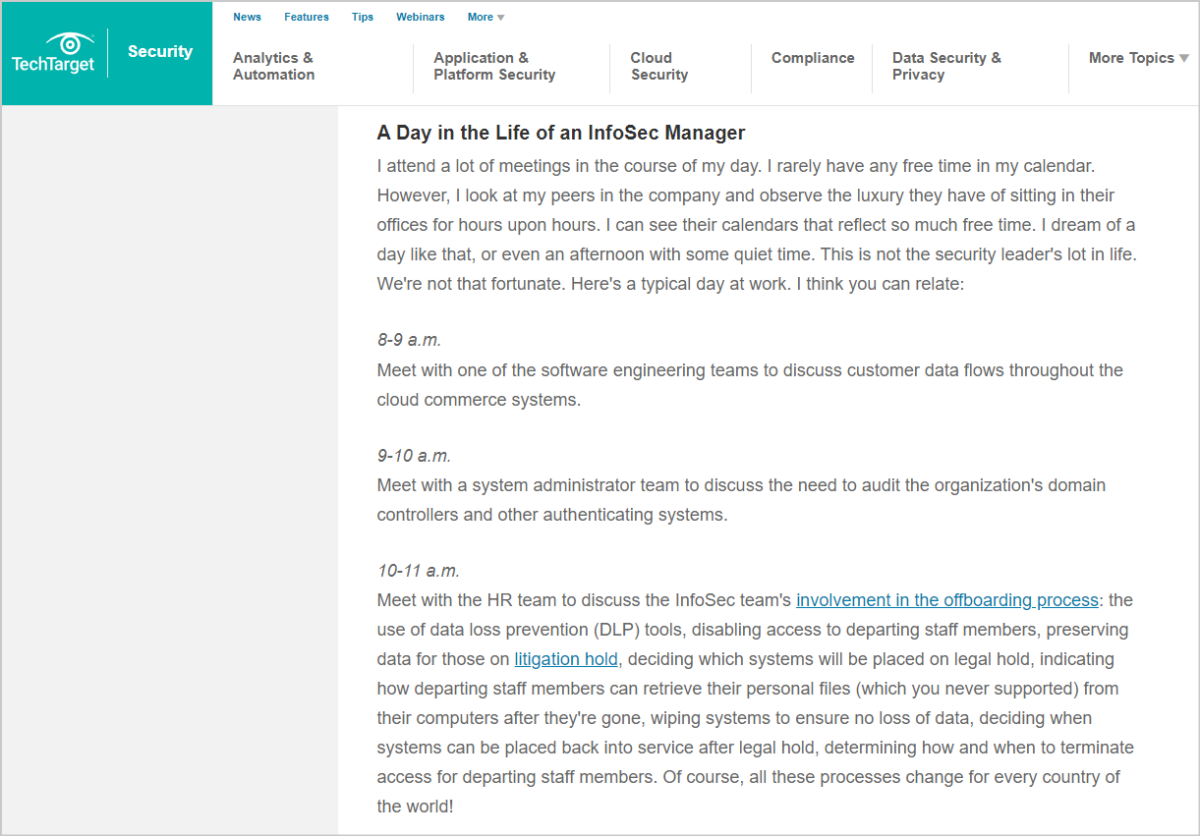Free Cybersecurity Course
Enter the cybersecurity field with our free introductory course. Learn the basics and build a strong foundation.
Most businesses today, regardless of the industry that they’re in, run a part or all of their operations digitally. For that reason, precautionary cybersecurity measures and incident response protocols have become imperative. And for most organizations, the efforts to install security systems, establish security protocols, and respond to any security breach are overseen by a cybersecurity manager.
There’s never been a better time to become a cybersecurity manager. Companies are currently struggling to fill cybersecurity positions, with one report from (ISC)² showing that there is a need for 4 million more security professionals to enter the workforce immediately. And cybersecurity salaries are quite lucrative, especially at the managerial level.
In this article, we’ll show you how you can plan your career in cybersecurity management. You’ll learn about the technical skills you need to pick up, how to become a candidate for a managerial position, and more.
What Does a Cybersecurity Manager Do?
Cybersecurity managers oversee an organization’s end-to-end information security implementation. They are required to have both technical experiences in cybersecurity and be able to manage teams that handle specific aspects of the operation.
A big part of a cybersecurity manager’s job is educating teams on security risks and establishing cybersecurity policies to protect a company’s digital assets. As part of these efforts, they may organize interactions with different teams and produce materials on recent digital threats.
How To Become a Cybersecurity Manager: A Nine-Step Guide
Let’s take a look at how you can plan your cybersecurity career so that you can realize your dream of becoming a cybersecurity manager.
-
Meet the Educational Requirements (and Continue Learning)
-
Develop Your Skillset
-
Learn the Right Tools
-
Build Practical Experience
-
Get Certified and Consider a Master’s Degree
-
Move Up the Cybersecurity Career Ladder and Gain Some Managerial Experience
-
Find a Mentor
-
Your Network Is Your Net Worth
-
Apply for Cybersecurity Manager Roles (or Go for an Internal Promotion)
Meet the Educational Requirements (and Continue Learning)
Cybersecurity is a field where most companies will require you to have a strong educational background. The conventional way to attain the educational requirements needed for being a cybersecurity manager is by completing a college degree. Consider a bachelor’s in computer science or IT as a foundation for a career in cybersecurity.
Another educational option that aspirants have today is a bootcamp. A Cybersecurity bootcamp is a streamlined course that take students from novices to job-ready security analysts. The advantage of doing a bootcamp is that your education is more focused, meaning that the amount of time and money you’ll spend isn’t as onerous as taking the college degree route.
Your learning journey only starts with a degree or bootcamp. Cybersecurity is the kind of field where there are constant developments, so you should be prepared to continuously upskill yourself by completing cybersecurity courses, reading books, and perusing cybersecurity resources.
Develop Your Skillset
You will, of course, have to develop your skills as a cybersecurity analyst before you can make your way to a managerial position. Let’s take a look at what some of those skills are.
Technical Skills
Cybersecurity managers need to possess the following technical skills:
Security Risk Knowledge
A cybersecurity analyst needs to be able to detect different kinds of security risks. If you’re just starting out, then you should read the OWASP Top Ten list to familiarize yourself with common security risks that cybersecurity managers are required to address.
Risk Management
Every potential security risk that could arise in an organization or system has a concomitant protocol to mitigate it. For example, if you have broken access control, then you would have the access control software updated and revisit the assigned access clearances thereafter. Cybersecurity managers need to have a strong understanding of how to manage each security risk that may occur.
Networks
Most of the systems that you will work with will include network devices. For that reason, cybersecurity professionals need to have a strong understanding of network security and the common security issues that crop up in networked systems.
Operating Systems
As a cybersecurity professional, you will find yourself working with devices across various operating systems. You need to have a grasp of security features in different operating systems and what additional software (firewalls, VPNs, etc) you can use on each of them. You should, at the very least, be familiar with the Windows and Linux ecosystems.
Scripting
Not all cybersecurity professionals need to know how to script but it’s a requirement in some roles. Either way, it is highly recommended that you know how to script because you can use it to automate a lot of the tasks that are part of security operations. Python and PowerShell are two scripting languages that you can consider if you’re just starting out.
Soft Skills
Soft skills are an important part of the cybersecurity repertoire, especially at the managerial level. Here are a few that you should emphasize as part of your preparation.
Problem-Solving
Most of the work that you do on a day-to-day basis as a cybersecurity manager will involve solving problems. It’s essential to have a grasp of problem-solving approaches and be able to calmly deal with issues that arise as part of your work.
Interpersonal Skills
As we said earlier, cybersecurity managers have to frequently interact with both people within their team and outside it. You need to have good communication and collaboration skills so that those interactions go smoothly.
Creativity
Cybersecurity is a field that’s constantly evolving. You won’t be able to go back to the books for every problem that you face. So it becomes essential that you’re able to deploy a degree of creativity for the solutions that you come up with.
Learn the Right Tools
This is a field where professionals use a range of cybersecurity tools to assist them with the work that they do. Spybot, Webroot, Atera, and Qualys are some of the tools that you should learn how to use to carry out functions like vulnerability management and virus detection.
Build Practical Experience
Experience is essential for anyone who wants to rise to a managerial position. The work that you do before becoming a cybersecurity manager will give you a technical understanding of the field and show you how teams can work together in a professional environment.
Try to amass at least five years of experience before you consider applying for cybersecurity manager roles. Early on in your career, focus on learning security strategies and tactics used to deal with online threats. Once you have that down, observe how your manager works on areas like project management and team building. Doing so will give you the practical experience that you need to assume higher responsibilities yourself.
Get Certified and Consider a Master’s Degree
Having the relevant skills is, of course, a requirement for a security manager position. But an advanced degree can be just the leg up that you need if you want to make a strong case for yourself in interviews. Many colleges offer specialized graduate degrees in cybersecurity.
Another step you can take is to complete cybersecurity certifications. The certifications you choose will depend on the particular area within cybersecurity that you want to specialize in.
Move Up the Cybersecurity Career Ladder and Gain Some Managerial Experience
Even if you’re early in your career, try to take on leadership roles whenever possible. This can even be as a task lead within a project that you’re working on. You might consider offering to lead a team of interns or entry-level analysts on a project. The experience that you gain by doing that will help you understand management strategies and show higher-ups that you have what it takes to lead a team.
Find a Mentor
Mentors can help you understand how the industry works and give you tailored guidance based on your goals. You can approach senior colleagues who you have a good rapport with within your company with a request for mentorship. Make sure to have a specific ask and structure the engagement in a manner that’s convenient for your mentor.
Your Network Is Your Net Worth
Networking is a key skill for anyone who wants to work in a managerial position. It’s one that can help you land a job and help you with things like recruitment once you assume your role as cybersecurity manager.
If you’re early in your career, start networking within your company. Get to know senior cybersecurity professionals and recruiters who bring in new talent. Interacting with these folks will give you an understanding of what it takes to move up the career ladder in this field.
You should also check out meetups and conferences. These are opportunities to meet with a wide range of stakeholders in the cybersecurity field.
Apply for Cybersecurity Manager Roles (or Go for an Internal Promotion)
The easiest way to land a job as a cybersecurity manager is through an internal promotion. If you’ve been a strong performer over a period of time, then you are likely to already be in consideration for a promotion. You can then approach HR or your manager to convey an interest in applying for a cybersecurity manager role.
That said, don’t be afraid to keep an eye out for openings in other companies. It’s often the case that candidates are able to command higher salaries when they move companies for promotion. Make sure to update your resume and brush up on your interview skills as you get back on the market for cybersecurity manager roles.
Get To Know Other Cybersecurity Students
Dylan Wood
Cyber Threat Analyst at Trustwave Government Solutions
Vianey Luna
IT Security Specialist at Cooper Machinery Services
Karen Peterson
Compliance Advisory Associate at Coalfire
Cybersecurity Manager Job Requirements: A Quick Overview
Let’s find out what companies expect from candidates applying for the cybersecurity manager role.
Foundational Knowledge
Basic cybersecurity knowledge is an obvious requirement for the job. That means understanding common security threats, incident response, and precautionary measures such as firewalls.
Education
Learn and then keep learning—in cybersecurity, your education doesn’t stop after your bootcamp or degree is completed. The more certifications you have under your belt, the better.
Skills
A thorough understanding of end-to-end cybersecurity operations is essential for any cybersecurity manager. You must be able to set up security infrastructure from scratch, analyze the hardware and software infrastructure of an organization, and install security software on different kinds of systems.
Cybersecurity managers can work in diverse industries such as healthcare, banking, and retail. And so they should be able to understand the business context within which their organization operates, and the security concerns that come with that.
Leadership skills are another key requirement of the job. Cybersecurity managers are assigned teams consisting of analysts, network engineers, and other professionals. They need to be able to manage resources and have the communication skills required to create an environment of collaboration within these teams.
Other Requirements
The Certified Information Security Manager (CISM) certification is often recommended to professionals who aspire to a managerial position in the industry. It covers key topics like cyber threats, risk management, and information security governance.
Becoming a Cybersecurity Manager: Real-Life Examples To Learn From
Here are a few online resources from which you can draw learnings and inspiration for your journey as a cybersecurity manager.
Todd Barnum

Todd Barnum is GoPro’s Chief Information Security Officer and the author of The Cybersecurity Manager’s Guide: The Art of Building Your Security Program. The linked post contains an excerpt from the book where Barnum goes over a day in the life of a cybersecurity manager. It is an hour-by-hour account of the daily routine of someone in this role and details the kind of meetings, presentations, and other work that you will do in the role.
Jordan M. Schroeder
Jordan M. Schroeder is a board member of the National Cyber Resilience Advisory Board and a seasoned chief information security officer. In the linked video, Schroeder goes over some of his best tips for cybersecurity leaders. He covers how to deal with both the ordered and unordered side of cybersecurity and goes over how to use the Cynefin framework for security management.
How Much Can You Earn as a Cybersecurity Manager?
Cybersecurity management is a lucrative career that comes with a lot of nice perks. The current average salary of cybersecurity managers is $168,166.

What Does the Career Path for a Cybersecurity Manager Look Like?
Most cybersecurity professionals begin their careers as cybersecurity analysts. This is a role where you’ll be assigned specific aspects of a larger system. You’ll deal with things such as incident response, network analysis, and intrusion detection.
From an entry-level role, you can move up to being a cybersecurity engineer or architect. These are positions in which you conceive and build parts of cybersecurity systems using various programming languages and frameworks. Working in this capacity will give you a deep understanding of how systems work and how to deal with attacks.
Once you have upwards of five years of experience and have worked on both specific parts of cybersecurity systems and contributed to building them subsequently, you can apply for a cybersecurity manager role. Those who have extensive experience as cybersecurity managers move on to positions such as Chief Information Security Officer and VP of Cybersecurity.
Resources To Look for Cybersecurity Manager Jobs
Here are a few avenues that you can turn to for vacancies in the cybersecurity management position.
Job Boards
The following job boards carry job postings for cybersecurity professionals.
Network and LinkedIn
Networking can give you access to roles that aren’t advertised on job boards. So make sure that you’re always meeting new people in the cybersecurity field and that they know you’re looking to work in a managerial position.
LinkedIn is a great place to kick off your networking efforts. The platform allows you to easily meet cybersecurity professionals and interact with them in groups. Make sure that your LinkedIn profile is always up to date and that you are active on the platform, which leads to increased engagement with your network.
Slack and Online Communities
Here are a few Slack channels that you can join to keep up with developments in the cybersecurity space and find out about openings.
FAQs About Becoming a Cybersecurity Manager
We’ve got the answers to your most frequently asked questions.
Is Being a Cybersecurity Manager a Good Career?
By any measurement, cybersecurity is a great career. The job prospects are great, the salaries are high, and given that the field is constantly changing, you’ll never get bored.
How Long Does It Take To Become a Cybersecurity Manager?
You need at least five years of experience in cybersecurity to become a manager.
What Is the Difference Between a Cybersecurity Manager and an IT Manager?
IT managers focus on all aspects of setting up and maintaining the information technology infrastructure of an organization. Cybersecurity managers, on the other hand, work narrowly on the security infrastructure and protocols.
Is 40 Too Old To Start a Career in Cybersecurity?
It’s never too late to start a career in cybersecurity. Anyone willing to invest time in picking up skills in this field can eventually make a career in it.
Is Cybersecurity Harder Than Coding?
Coding is only a small part of being a cybersecurity professional. The job is much broader and involves dealing with all aspects of protecting the data and systems of an organization.
Since you’re here…
There are hundreds of thousands of vacant cybersecurity jobs, and one of them has your name on it. You can enter the industry in 6 months flat with our Cybersecurity Course. We’ve helped over 10,000 students make huge career changes with our fully flexible mentor-led bootcamps. Explore our free cybersecurity course curriculum today to start your career switch story.







